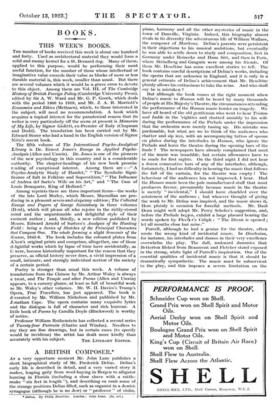BOOKS.
THIS WEEK'S BOOKS.
THE number of books received this week is about one hundred and forty. Used as architectural material they would form a solid and roomy kennel for a St. Bernard dog. Many of them, applied to this purpose, would be performing their most useful function, for the number of those whose intellectual or imaginative value exceeds their value as blocks of more or less durable material is, this week, smaller than usual. But there are several volumes which it would be a grave error to devote -to this object. Among them are Vol. III. of The Cambridge History of British Foreign Policy (Cambridge University Press), edited by Sir A. W. Ward and Mr. G. P. Gooch, which deals with the period 1866 to 1919, and Mr. J. A. R. Marriott's Economics and Ethics (Methuen), which, to those interested in the subject, will need no recommendation. A book which acquires a topical interest for the paradoxical reason that its writer is very particularly off the scene at present is Memories of My Life, by Signor Giolitti, ex-Premier of Italy (Chapman and Dodd). The translation has been carried out by Mr. Edward Storer who had a hand in the English version of Signor Nitti's recent book.
The fifth volume of The International Psycho-Analytical Library is Dr. Ernest Jones's Essays in Applied Psycho- Analysis (Allen and Unwin). Dr. Jones is one of the pioneers of the new psychology in this country and is a considerable authority. The chapter-headings of his new book promise roading of exceptional interest. Among them are :—" A Psycho-Analytic Study of Hamlet," "The Symbolic Signi- ficance of Salt in Folklore and Superstition," "The Influence of Andrea del Sarto's Wife on his Art," and "The Case of Louis Bonaparte, King of Holland."
Among reprints there are three important items—the works of the late Lord Morley, which Messrs. Macmillan are pro- ducing in a pleasant seven-and-sixpenny edition; The Collected Essays and Papers of George Saintsbury in three volumes (D3nt), which will please all who rejoice in the richly-stored mind and the unpardonable and delightful style of their eminent author ; and, thirdly, a new edition published by Messrs. Edward Arnold of Surtees's Analysis of the Hunting Field : being a Series of Sketches of the Principal Characters that Compose One. The whole forming a slight Souvenir of the Season, 1845-6. The book includes the coloured plates from A'ken's original prints and comprises, altogether, one of those dolightful works which by lapse of time have accidentally, as it were, become historically important for the reason that they preserve, as official history never does, a vivid impression of a small, intimate, and strongly individual section of the society of a certain period.
Poetry is stronger than usual this week. A volume of translations from the Chinese by Mr. Arthur Waley is always a treat, and The Temple and other Poems (Allen and Unwin) appears, to a cursory glance, at least as full of beautiful work as Mr. Waley's other volumes. Mr. W. H. Davies's Tramp's Opera, True Travellers, has just appeared. The book is decorated by Mr. William Nicholson and published by Mr. Jonathan Cape. The opera contains many exquisite lyrics and the dialogue is full of character and rich humour. A little book of Poems by Camilla Doyle (Blackwood) is worthy of notice.
Professor William Rothenstein has collected a second series of Twenty-four Portraits (Chatto and Windus). Needless to say they are fine drawings, but in certain cases (to specify would be invidious) the artist has dealt more kindly than


























































 Previous page
Previous page